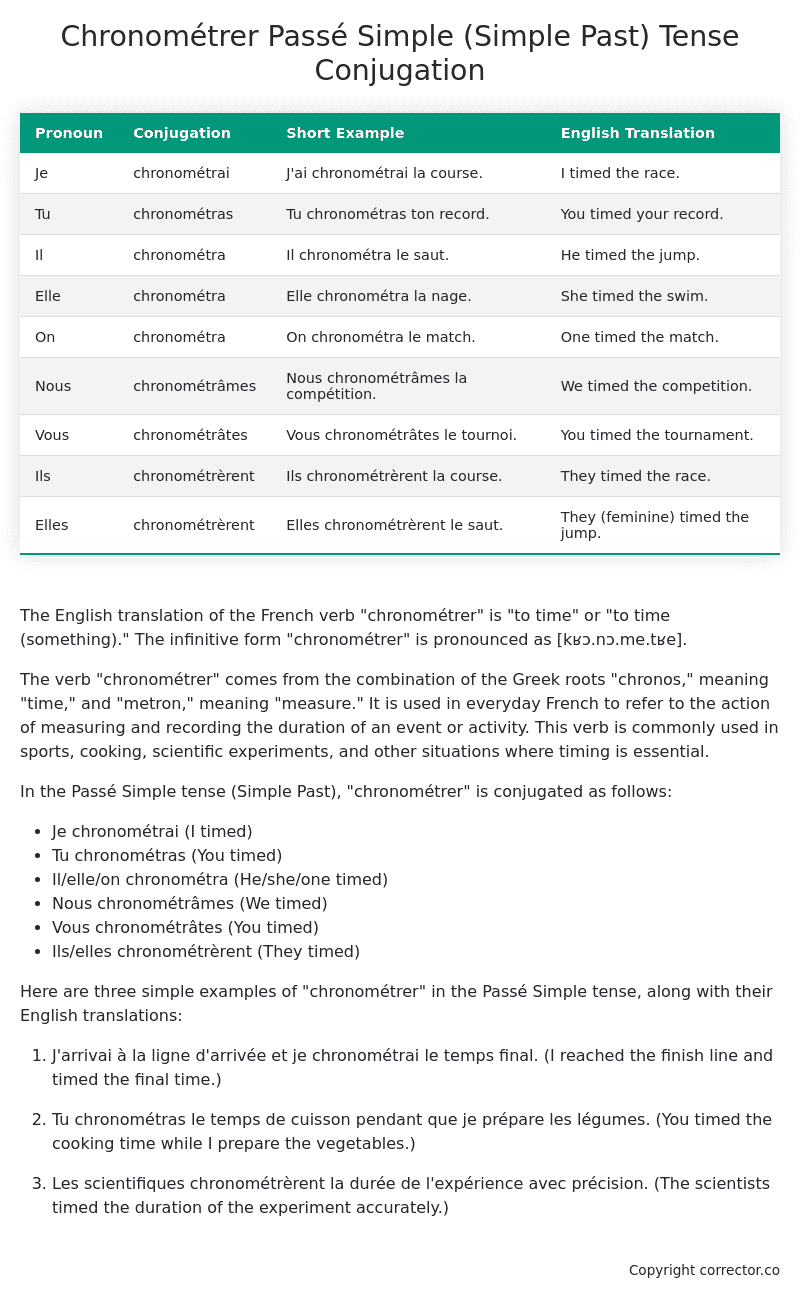Passé Simple (Simple Past) Tense Conjugation of the French Verb chronométrer
Introduction to the verb chronométrer
The English translation of the French verb “chronométrer” is “to time” or “to time (something).” The infinitive form “chronométrer” is pronounced as [kʁɔ.nɔ.me.tʁe].
The verb “chronométrer” comes from the combination of the Greek roots “chronos,” meaning “time,” and “metron,” meaning “measure.” It is used in everyday French to refer to the action of measuring and recording the duration of an event or activity. This verb is commonly used in sports, cooking, scientific experiments, and other situations where timing is essential.
In the Passé Simple tense (Simple Past), “chronométrer” is conjugated as follows:
- Je chronométrai (I timed)
- Tu chronométras (You timed)
- Il/elle/on chronométra (He/she/one timed)
- Nous chronométrâmes (We timed)
- Vous chronométrâtes (You timed)
- Ils/elles chronométrèrent (They timed)
Here are three simple examples of “chronométrer” in the Passé Simple tense, along with their English translations:
-
J’arrivai à la ligne d’arrivée et je chronométrai le temps final.
(I reached the finish line and timed the final time.) -
Tu chronométras le temps de cuisson pendant que je prépare les légumes.
(You timed the cooking time while I prepare the vegetables.) -
Les scientifiques chronométrèrent la durée de l’expérience avec précision.
(The scientists timed the duration of the experiment accurately.)
Table of the Passé Simple (Simple Past) Tense Conjugation of chronométrer
| Pronoun | Conjugation | Short Example | English Translation |
|---|---|---|---|
| Je | chronométrai | J’ai chronométrai la course. | I timed the race. |
| Tu | chronométras | Tu chronométras ton record. | You timed your record. |
| Il | chronométra | Il chronométra le saut. | He timed the jump. |
| Elle | chronométra | Elle chronométra la nage. | She timed the swim. |
| On | chronométra | On chronométra le match. | One timed the match. |
| Nous | chronométrâmes | Nous chronométrâmes la compétition. | We timed the competition. |
| Vous | chronométrâtes | Vous chronométrâtes le tournoi. | You timed the tournament. |
| Ils | chronométrèrent | Ils chronométrèrent la course. | They timed the race. |
| Elles | chronométrèrent | Elles chronométrèrent le saut. | They (feminine) timed the jump. |
Other Conjugations for Chronométrer.
Le Present (Present Tense) Conjugation of the French Verb chronométrer
Imparfait (Imperfect) Tense Conjugation of the French Verb chronométrer
Passé Simple (Simple Past) Tense Conjugation of the French Verb chronométrer (You’re reading it right now!)
Passé Composé (Present Perfect) Tense Conjugation of the French Verb chronométrer
Futur Simple (Simple Future) Tense Conjugation of the French Verb chronométrer
Futur Proche (Near Future) Tense Conjugation of the French Verb chronométrer
Plus-que-parfait (Pluperfect) Tense Conjugation of the French Verb chronométrer
Passé Antérieur (Past Anterior) Tense Conjugation of the French Verb chronométrer
Futur Antérieur (Future Anterior) Tense Conjugation of the French Verb chronométrer
Subjonctif Présent (Subjunctive Present) Tense Conjugation of the French Verb chronométrer
Subjonctif Passé (Subjunctive Past) Tense Conjugation of the French Verb chronométrer
Subjonctif Imparfait (Subjunctive Imperfect) Tense Conjugation of the French Verb chronométrer
Conditionnel Présent (Conditional Present) Tense Conjugation of the French Verb chronométrer
Conditionnel Passé (Conditional Past) Tense Conjugation of the French Verb chronométrer
Conditionnel Passé II (Conditional Past II) Tense Conjugation of the French Verb chronométrer
L’impératif Présent (Imperative Present) Tense Conjugation of the French Verb chronométrer
L’impératif Passé (Imperative Past) Tense Conjugation of the French Verb chronométrer
L’infinitif Présent (Infinitive Present) Tense Conjugation of the French Verb chronométrer
L’infinitif Passé (Infinitive Past) Tense Conjugation of the French Verb chronométrer
Le Participe Présent (Present Participle) Tense Conjugation of the French Verb chronométrer
Le Participe Passé (Past Participle) Tense Conjugation of the French Verb chronométrer
Struggling with French verbs or the language in general? Why not use our free French Grammar Checker – no registration required!
Get a FREE Download Study Sheet of this Conjugation 🔥
Simply right click the image below, click “save image” and get your free reference for the chronométrer Passé Simple tense conjugation!

Chronométrer – About the French Passé Simple (Simple Past) Tense
Formation
Usage
Narration
Historical Context
Interactions with other tenses
Passé Composé
Imparfait
Conditional and Subjunctive
Summary
I hope you enjoyed this article on the verb chronométrer. Still in a learning mood? Check out another TOTALLY random French verb conjugation!


